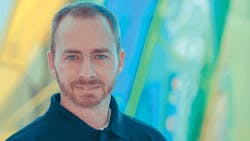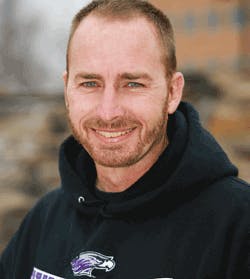Army veteran, former ER nurse and construction worker, volunteer firefighter, student, Harley Davidson intern, father, hiker, fisherman: All of these terms can be used to describe Craig A. Everson, the 2012 Future Leader in EHS.
EHS Today and UL PureSafety are pleased to name Everson, a University of Wisconsin-Whitewater (UW-Whitewater) student earning his bachelor's degree in occupational health and safety, the 2012 Future Leader in EHS. Along with a $5,000 scholarship, Everson will receive access to UL PureSafety's safety and health software and information solutions and will serve on the EHS Today editorial advisory board for 2 years.
The Future Leaders in EHS program was created to support and encourage EHS students as they respond to the challenges of the 21st century workplace and lead the way in keeping tomorrow's workers safe, healthy and on the job. The judges selected Everson, 42, based on work and life experience; his respect for the EHS profession; his vision for safer workplaces; and the leadership roles he holds both in his university, as president of the Student Safety Organization, and in the community, as a volunteer firefighter and former EMT.
"EHS has so many facets of importance, from the sustainability of drinking water and clean air to the resources we all use and, most importantly, the safety and health of people," Everson wrote in his application. "The safety of the worker, the public and the environment is what makes this field of study so important."
A Leader is Born
Everson's family has deep roots in the construction industry – his father, grandparents, uncles and some of his aunts worked in the industry, and it was considered a foregone conclusion that he would follow in their footsteps. While he did enter the profession following high school, a neck and back injury sustained on the job – a ladder collapsed and he fell more than a storey onto a concrete floor – prompted him to re-evaluate his future.
Everson left the construction industry and served in the U.S. Army, where he was trained as a nurse. It was during his subsequent career as an emergency room nurse that he gained a full appreciation of the extent to which occupational injuries impact workers and their loved ones. In the ER, Everson tended to patients suffering from work-related injuries, including those caused by falling materials, lack of proper lockout/tagout, electrical burns, nail gun wounds and more. Witnessing these injuries made Everson determined to put a stop to industrial accidents.
"I realized that, while I was doing wonderful things in the emergency room, something's got to be done before [workplace injuries] happen," he explains.
This realization set Everson on the EHS path. He accepted a position as the occupational health and safety manager of a poultry plant in Georgia, where he gained experience and a better understanding of the profession. But when he moved back to his home state of Wisconsin to be closer to family, he soon realized that not having an EHS degree could prevent him from finding employment in this field. Then he saw an advertisement for the UW-Whitewater's occupational and environmental safety and health program.
"I immediately got on the phone, spoke to the [department] chairperson and enrolled in the program that day," he says.
Everson, who will graduate with his bachelor's degree in May 2013, recently secured a safety internship at the Harley Davidson headquarters. He intends to enter the work force full-time after graduation and eventually return to UW-Whitewater to earn his master's degree in occupational safety and health.
The EHS Lifestyle
As the father of two daughters – Stephanie, 13, and Samantha, 7 – Everson can see the bigger picture of how safety and health impacts our lives and how it affects not only employees, but also communities and the environment.
"With my experience as a volunteer firefighter, I understand the hazardous materials in my community," he wrote in his application. "As a hiker and fisherman, I have a concern for the environment. Environmental hazards can devastate a community of people innocent to the manufacturing process. Workers may understand a risk when they are educated about chemicals or process they are working with, but the community is not given that option. The EHS professional has an environmental duty to protect the air and water the community depends on."
That concern for the environment and for the safety, health and well-being of workers and the"I was impressed by Mr. Everson's clear direction for his future opportunities in the EHS profession," says Heinlein, who served on the scholarship selection committee. "He has a proven track record of service above self for the betterment of working conditions for his fellow workers. Mr. Everson also shows clear leadership abilities that will serve him well long into the future."
But it's Everson who best sums up his own approach to EHS:
"Environmental safety and health is not a career," he wrote in his application. "It's a lifestyle."
Read about Tiffany Barnett, 2012 Future Leader in EHS Runner-Up
About the Author

Laura Walter
Laura Walter was formerly senior editor of EHS Today. She is a subject matter expert in EHS compliance and government issues and has covered a variety of topics relating to occupational safety and health. Her writing has earned awards from the American Society of Business Publication Editors (ASBPE), the Trade Association Business Publications International (TABPI) and APEX Awards for Publication Excellence. Her debut novel, Body of Stars (Dutton) was published in 2021.


